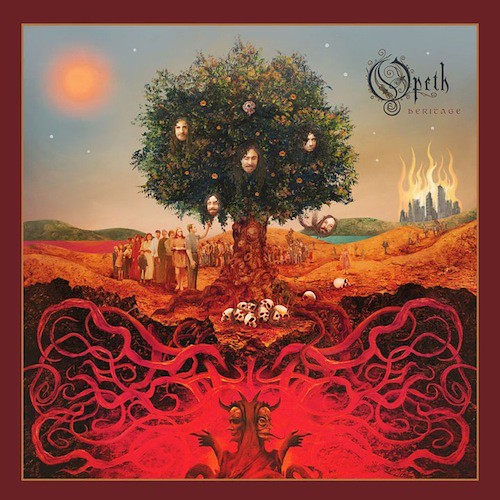Opeth: Heritage Music Review
Released: 14/09/2011
Genre: Progressive Rock/Metal, Jazz Fusion
Label: RoadRunner
Songs: 10 (2 Bonus)
Heritage is the tenth album to be released by Swedish progressive metal band Opeth, and the follow up to the simply fantastic 'Watershed' album from 2008.
This album shows straight from the beginning, the departure from their death metal roots and a journey into the prog-rock, pyschedelic musical sounds that have apparently influenced the band, or at least lead vocalist and guitarist, Mikael Akerfeldt.
Whilst it isn't their first foray into a fully clean album, (The 'Damnation' album of 2003, which was absent of death metal growls and their usual heavy guitars and drum sounds) it's definitely a dramatic change in sounds as they pay tribute to the bands they grew up with and loved.
The band's influences of artists from the 70's for this album is practically seeping through the edges of the CD itself, as not only does the music sound inspired by bands such as King Crimson and Jethro Tull, but the overall sound of the album just sounds so radically different to other albums previously made by Opeth.
'The Devil's Orchard', first single for the album.
With the acoustic intro of 'I Feel The Dark', the sounds of folk music drifts through slowly as Mikael continues to enforce the clean vocals on the record, and rather well at that. It continues along this path for a while, before stopping abruptly and sounding off a strange, darkened fanfare before the band comes back in with a rather evil and crushing riff, making you slowly nod your head as Opeth do what they do best in implenting both strange and moody tones with both clean, smooth style and alternating with heavy sounds. 'Slither' is a much more upbeat and quicker track on the record, and to the average Opeth listener, sounds pretty bizarre the first time around, although the same can be said about the whole album. Dedicated to the late, great Ronnie James Dio, 'Slither' throws some brilliant riffs at us, both fast and complex, accompanied by a few guitar solos before bringing the song to a close with the conclusion of a small acoustic melody which fades to black.
The next track, 'Nepenthe' starts off with some quiet chords before the drums slowly ease their way in alongside the bass. Mikael's singing slides over the top of the chords, sounding very haunting over the rest of the band, as the song continues to move along quietly. But with the sudden introduction of a quick keyboard run, all the instruments explode suddenly as a solo bursts out on top of the music, before becoming quiet once more as quickly as it had started. Only for a few moments however, as a slow drum groove leads the way for another sudden outburst from the band, and another brilliant solo. From here on, the album's tone shifts as the songs 'Haxprocess' and 'Famine' drift into much darker territory. With the blend of acoustic and piano pieces throughout the songs, the sound becomes a lot more moodier and truly draws you into a state of haunting uncertainty.
'Master's Apprentice' from the Deliverance record, showcasing
Opeth's usual style of music, heavy, yet incorporating clean elements.
'Haxprocess' ends with a fantastic bassline echoing quietly through as a slow guitar solo loops over it smoothly and draws the song to a close, before leading into the strange, almost arabian sounds of 'Famine', with the sounds of flutes and bongos, amongst some other strange sounds. Simple piano chords interject the ambient sounds and Mikael's voice sings sadly over it quietly, following the melodies softly. A strange guitar riff fades in over the piano as Axenrot leads into a bizarre, disorientating groove, that continues to run darkly for a bit, before bringing back the familiar mellotron sounds used rather frequently on the album, with some frankly cheery sounding melodies from the vocals. But of course, it's only for so long, before a strange drum fill leads into another heavy, slow and sludgy sounding riff that pounds through alongside the slow drums. The song ends on a very creepy sounding piano line, before fading to black and bursting into the much more upbeat song, 'The Lines In My Hand'.
Standing alongside Slither as one of the quicker and more 'straight forward' tracks on the album, 'The Lines In My Hand', builds up slowly with some nice harmonised singing and happy guitar melodies, as the bass lines run under it very well. A quick pause in the track to introduce a short piano run, as it all kicks back in again, faster than before as the riffs and drums become more groovy and complex. As Mikael calls over the guitars triumphantly, the song comes to a close, and so begins the strange guitar intro to 'Folklore'. As the title suggests, this track sounds very folky, with some nice guitarwork leading alongside the drums. One of the longer tracks on the album, second to 'Famine', this song immediately shows to be one of the strongest on it, as all the changes flow rather well into each other, and Mikael's singing hanging over the slow stacatto pickings in the verse very well. In the middle of the song, it becomes quieter and a short acoustic piece flows into a piano line, which follows the same notes as the guitar before it, before breaking out into rather epic sounding solo section right before Mikael comes in to finish up the song, before fading out.
The album comes to a close on 'Marrow Of The Earth', which is an instrumental piece, and a good one at that. The acoustic guitar and electric guitar bounce back and forth from each other throughout the track very well, and the whole song breaths brilliantly with it, holding it up as another of the best songs on the album. Chilling at moments, yet more uplifting at others. As drums slowly move into the song in the last minute or so, the haunting notes continue to ring alongside it as the whole album fades to a close, and on a pretty good note (not musically speaking that is!).
Overall, Heritage is a well-made album, that incorporates the influences that Opeth intended to pay heed to with much success. It sounds good and the album is a good and diverse addition to their catalogue. However, seeing as it is a rather sudden turn of direction in sense of style and playing, it certainly takes more than one listen to truly appreciate it, and may leave some Opeth fans feeling a little disappointed at the lack of their trademark extreme heavy sounds. Whilst not their greatest album, it's by no means their worst, being accessable to new fans of the band and definitely worth the listen.
- Andy Robison












0 comments:
Post a Comment